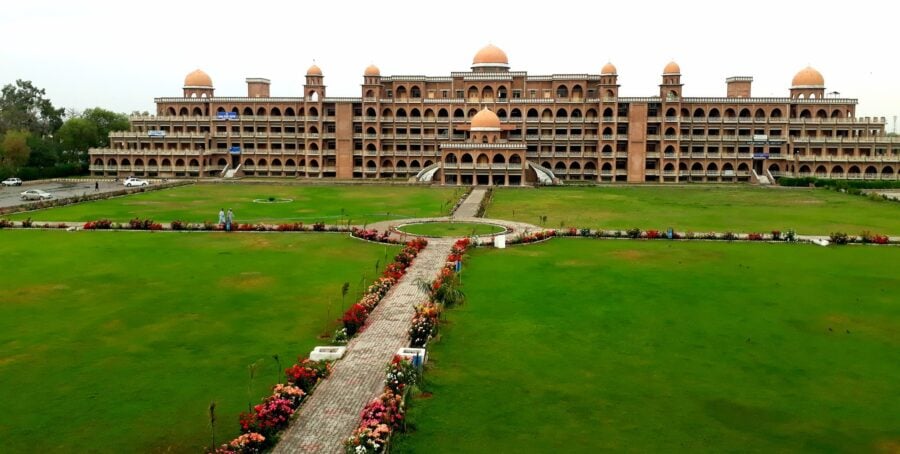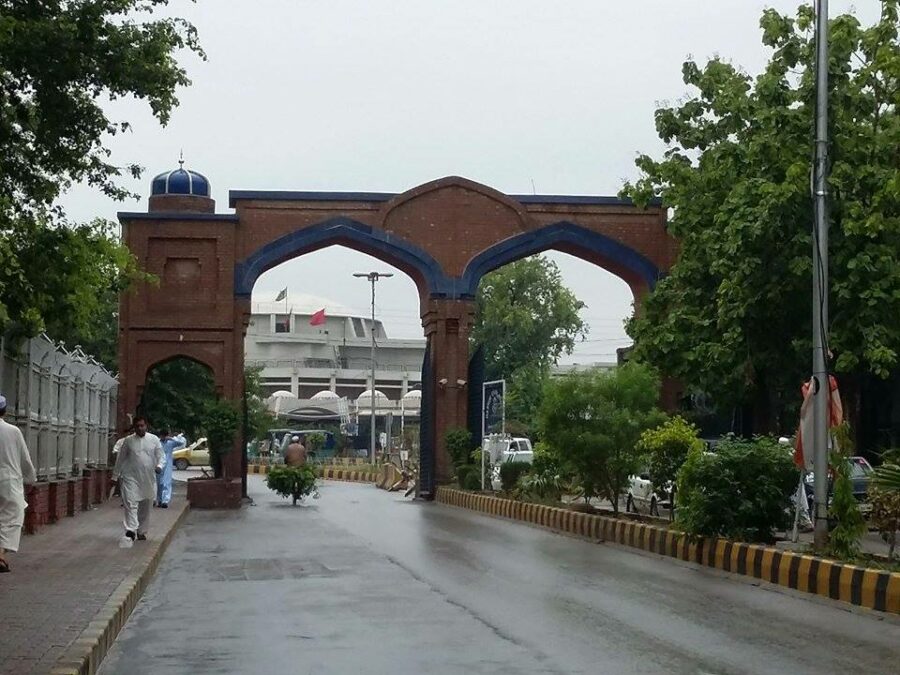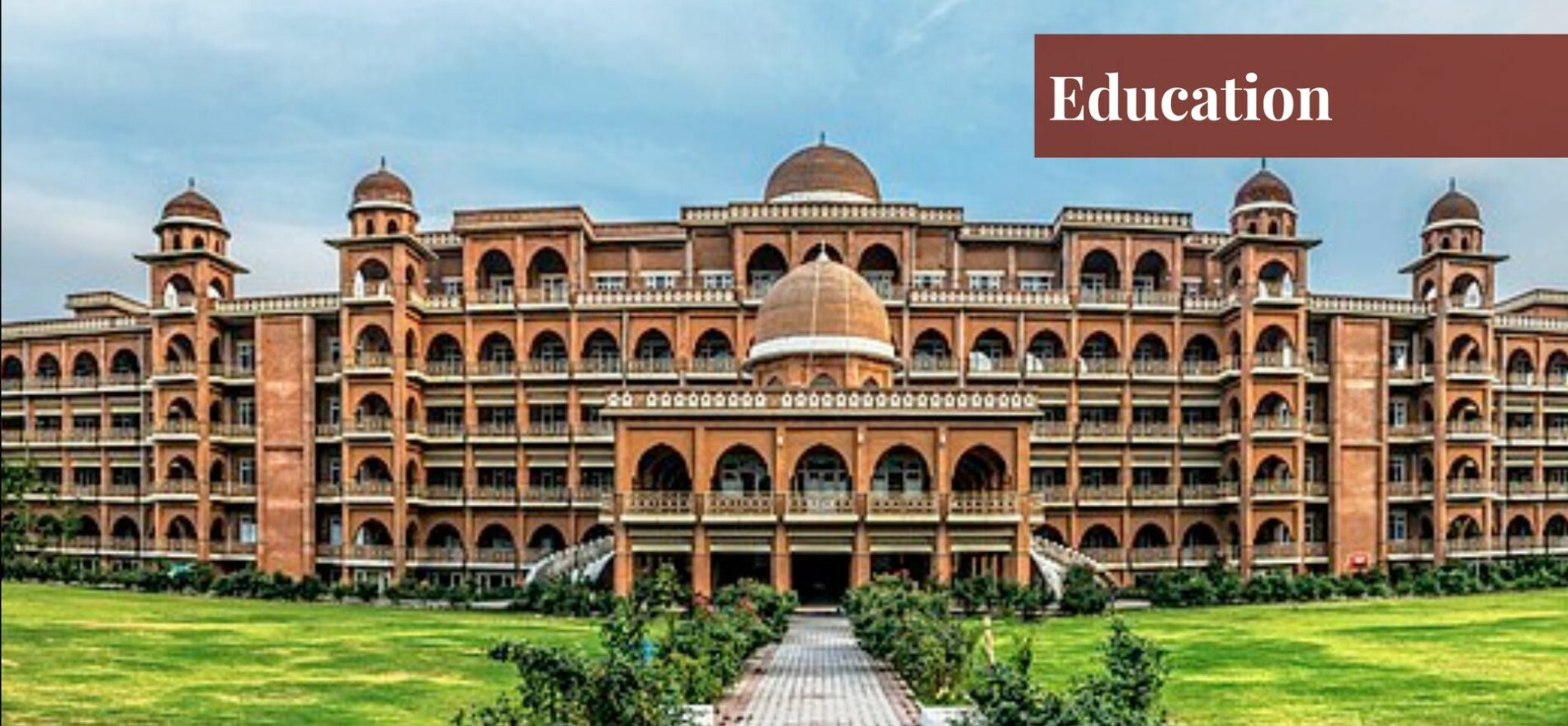Ms Alishbah Syed is pursuing her Bachelor's degree in International Relations from University of Peshawar.
Introduction
The University of Peshawar, shortened for UoP and popularly called Peshawar University, is a public research university located in Peshawar, Khyber Pakhtunkhwa, Pakistan. Essentially, it is a teaching, affiliating, examining, and residential institution. With programs for undergraduate, post-graduate, and doctoral studies and approximately 14,000 enrolled students attending the university, it is one of the oldest universities in the province and highest rated universities in the country.
Campus
University of Peshawar’s residential campus is about 10km northwest of Peshawar city center, on the main road leading towards the Pakistan-Afghan border. Covering about 1,050 acres with a population of approximately 35,000, it is no small university campus. Facilities of shops, a cafeteria, a market, a health centre, and several banks exist on the campus.

The campus is also home to national organizations like the Pakistan Council of Scientific and Industrial Research, North Regional Laboratories, the Academy for Rural Development, the Pakistan Forest Research Institute and College, the University of Engineering and Technology, the Agricultural University, the Institute of Nuclear Medicine and the Khyber Teaching Hospital. One thing notable about this institution is the fact that it offers education right from kindergarten to Ph.D. level.
Vision and Mission
According to the University of Peshawar’s own writings, its vision and mission are similar to any other university but it has an added clause of having the historical responsibility of providing quality high education and research facilities to the whole region. The university’s vision is to be a prominent public university in the region, recognized globally for its impact factor. The mission is to achieve excellence in all of its sectors to aid in the advancement of society and the nation.
History
The University of Peshawar was an unfinished symphony, remaining long unrealized. It was a dream of a university in Peshawar. It is said that the first seeds of this dream, the University, might have been sown by Sir Sahibzada Abdul Qayyum Khan who formulated the idea and founded Islamia College (The Dar-Ul-Uloom) in 1913 almost at the mouth of the Khyber Pass, the first sign of civilization there.

The founder of Pakistan, Quaid-e-Azam Muhammad Ali Jinnah, visited the college in 1928. He had great admiration for its existence and in his admiration added the college as his fortune’s heirs with heavy hitters like the Aligarh University and Sindh Madrassa (his own school) in 1939. On April 12th, 1948, Quaid-e-Azam addressed the students and teachers of the Islamia Collage Peshawar. He said that nothing was dearer to his heart than a university in NWFP (now renamed Khyber Pakhtunkhwa) and that such a university would come sooner if it went about in the right way, spreading the light of education through Central Asia.
The University of Peshawar was supposed to be a gift to students of the province in recognition of the part played in the making of Pakistan, specifically for fighting the Indians and capturing Azad Kashmir. A year later, efforts began for the establishment of the university. Chief Minister of NWFP (now Khyber Pakhtunkhwa) Abdul Qayyum Khan started a committee for its establishment. Its foundation stone was then laid by the then Prime Minister Mr. Liaqat Ali Khan on October 30, 1950. The University of Peshawar has since then grown out from its ‘three-classroom campus’ of the borrowed building of the government.
Accreditation
University of Peshawar is a recognized university by the Higher Education Commission of Pakistan (HEC). This university awards both undergraduate and postgraduate degrees
Admission Process
The University of Peshawar has a simple admission process, made even more accessible with its prospectus and application form being completely online. After completing the application form, it has to be printed. In addition, the fee invoice/challan of Rs.2000 is to be printed and deposited in any branch of United Bank Ltd.
The printed application form along with duly deposited Bank Challan/Invoice and the following documents then has to be submitted to the Admission Block – II adjacent to Central Library, University of Peshawar;
- F.A/F.Sc DMC (Part-I & II)
- IBCC Equivalency Certificate (For A-Level Only)
- Original Bank Voucher
- Domicile / CNIC
- Valid LAT Score Card (for BS-Law only)
Only those candidates would be declared eligible for provisional admission to BS having passed F.A/F.Sc/A-Level or equivalent DMC with required marks (minimum 45%). For the BS-Law (5-year) program, a valid LAT score card (50% marks in the LAT Test) is eligible to apply. Candidates who have passed the current and preceding session of the intermediate exam will have 1st priority in the admission process while those of more preceding sessions will be given 2nd priority.
National and International Rankings
The University of Peshawar ranked 801-1000th internationally according to the QS World University Ranking, placing it in 6th position nationally among the other Pakistani universities.
Faculties
There are a total of six faculties with their own departments under their jurisdictions.
Faculty of Arts And Humanities
- Department of Archaeology
- Department of Art and Design
- Department of English and Applied Linguistics
- Department of History
- Department of Philosophy
- Department of Tourism and Hotel Management
Faculty of Islamic And Oriental Studies
- Department of Arabic
- Department of Islamiyat
- Department of Pashto
- Department of Persian
- Department of Seerat Studies
- Department of Urdu
- Pashto Academy
Faculty of Life And Environmental Sciences
- Centre for Disaster Preparedness and Management
- Centre of Biotechnology and Microbiology
- Centre of Plant Biodiversity
- Department of Botany
- Department of Environmental Sciences
- Department of Geography and Geomatics
- Department of Geology
- Department of Pharmacy
- Department of Urban and Regional Planning
- Department of Zoology
- Institute of Chemical Sciences
Faculty of Management And Information Sciences
- Department of Journalism and Mass Communication
- Department of Library and Information Science
- Institute of Management Studies
Faculty of Numerical And Physical Sciences
- Department of Computer Science
- Department of Electronics
- Department of Mathematics
- Department of Physics
- Department of Statistics
Faculty of Social Sciences
- Department of Criminology
- Department of Economics
- Department of Gender Studies
- Department of International Relations
- Department of Political Science
- Department of Psychology
- Department of Regional Studies
- Department of Social Anthropology
- Department of Social Work
- Department of Sociology
- Institute of Education and Research
- Institute of Peace and Conflict Studies
Schools and Colleges
- University Model School
- University Public School
- Jinnah College for Women
- University College for Boys
- Quaid e Azam College of Commerce
- Law College
- College of Home Economics
Research Centres
- Area Study Centre
- NCE in Geology
- NCE in Physical Chemistry
- Pakistan Study Centre
- Shaykh Zayed Islamic Centre
If you want to submit your articles, research papers, and book reviews, please check the Submissions page.
The views and opinions expressed in this article/paper are the author’s own and do not necessarily reflect the editorial position of Paradigm Shift.


















